Every April, when spring is in the air, a comprehensive international trade event, the Spring Canton Fair, is also in full swing. The Canton Fair acts as a platform for exhibitors from all over the globe to communicate and make economic and technological cooperation. Also, because of the need for exhibitors with different language backgrounds to communicate, this fair is also a platform for translators to show their language proficiency. Translating, as a profession, with the internationalization of our country, is attracting more and more attention.
Knowing More about “Capricious” Translation
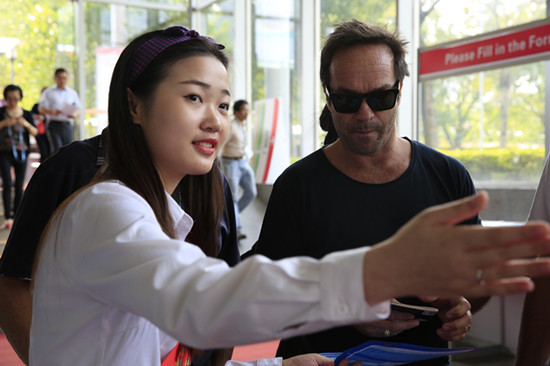
A guide patiently leads exhibitors into the exhibition hall
“Capricious” Translation Sparks Heated Discussion
In the press conference of the third session of CPPCC’s eleventh meeting, the spokesman LV Xinhua used a popular Internet slang in Chinese, “Ren Xing”, to reply to questions related to corruption. This word made the translator ZHANG Lei nervous because it was hard to be translated into English. After communicating with LV Xinhua, she decided to translate it as “capricious”, which sparked a heated discussion. Some people think its meaning is way beyond a single word. Our reporters interviewed several students. Some of them translated “Ren Xin” as to “follow one’s heart”. Others thought it should mean “be persistent in doing something” or “everyone does as he wishes”. There is even a fancy translation online combining two very popular Internet slang phrases together -- “everyone is very DUANG!. Anyway, there is no standard translation into one word. A good translation is supposed to convey the exact meaning and uses local language. Apart from the discussion about the translation of this popular term, a lot of people are increasingly interested in translating as a profession, which is charismatic in appearance, but enigmatic in nature. Since I, as a reporter, feel the same way, I went and searched for information about this profession and interviewed several famous translators on campus, with a goal of making the public familiar with translating.
Simultaneous Interpreting and Consecutive Interpreting -- Jobs with a High Bar
The ones that the public always see, whose performances are always captured by the camera are interpreters. According to the mode of interpreting, there are consecutive interpreting and simultaneous interpreting. Simultaneous interpreters are always regarded as “golden collar worker in language”. During consecutive interpreting, interpreters sit inside a booth and take notes when the speaker is talking. When the speaker finishes his paragraph or stops temporarily, the interpreters are to paraphrase all the information the speaker talked about in his source language correctly and completely, using clear and natural target language. In conference interpreting, interpreters are required to listen to a speech lasts from five to ten minutes, and use mature public speaking skills to interpret all the information the speaker included, accurately and completely.
Simultaneous interpreting means interpreting continuously to the audience while the speaker is still talking. Simultaneous interpreters use specially designed devices to provide this type of service, which is especially suitable for large seminars and international conferences. Usually, there will be two to three interpreters working alternately. Simultaneous interpreting is highly efficient and can guarantee that the conference or meeting goes smoothly. Currently, 95% of high-level international conferences use simultaneous interpreting, which is a piece of solid evidence of how broad simultaneous interpreting’s market is and how high its bar is set.
GDUFS, where talented translators are gathered
The School of Translation and Interpreting Studies (SITS) is a golden brand for GDUFS, where language studies are its specialty. Talented translators are gathered there. According to SITS’s Deputy Party Secretary DU Huangjun, most of the students from SITS obtain solid language capacity during their studies. Also, they actively take part in various competitions to improve their comprehensive skills. Unlike other schools, SITS creates more high-level practice opportunities for students to apply their knowledge to, apart from traditional theory-teaching in classes. The Interpretation Team and The Translation Team from SITS have been founded to undertake different tasks, such as providing interpreting service for ASEAN Expo, offering translation intern students for Canton Fair, etc. SITS has earned a good name by providing high-quality service to society and it’s believed to have a promising future as it further explores its possibilities into translation studies.
Practice Makes Perfect
Translating is always labeled as a high-paid or a sophisticated job. From many people’s perspective, translators are always elegant, with great language proficiency, a quick mind and composed manner. So we wonder: how they are able to become who they are?
Only Strenuous Practice Leads to Success
The word, practice, reveals how translators are able to become who they are. Interpreting is a golden brand for SITS, so its way of cultivating talents attracts much attention. Miss LI, an alumna from SITS, recalled how she was trained: for consecutive interpreting, students received training based on different topics. For simultaneous interpreting, it was more about improving their listening and speaking skills. Being trained for a specific topic not only helped them accumulate knowledge, but also broadened their horizon. “At the beginning, we listened to audio clips and watched news, and repeated after the speakers without looking at the scripts. That’s what we call ‘shadowing’. Later on, we did ‘paraphrasing’, which means reproducing the sentences with different words and expressions. For example, when we hear sentence like ‘It’s a beautiful sunny day!’, we reproduce it as ‘The weather is sunny!’”
Apart from attending regular classes, students from SITS also intensify their training by grouping with classmates or training individually after class. In group training, teammates search for audio and visual materials online or use relevant paper materials to practice. For individual training, everyone has different plans. Some translate in front of the mirror to see his or her own performance; some are more into imitating and practicing English in role play.
Compared with their predecessors, translators nowadays are more fortunate with unlimited translation resources at hand, most of them which come from the Internet. However, in the past, anyone who wanted to become a qualified translator had to go through a lot more. “Our teacher’s training at their time was lonesome.” said a teacher from SITS, “Their learning materials were a limited amount of foreign tapes and books. Therefore, they could only listen to the tapes again and again, imitating foreigners’ accent. In an unstable epoch, they grasped every opportunity to practice translating, some by translating famous people’s speech scripts into English.”
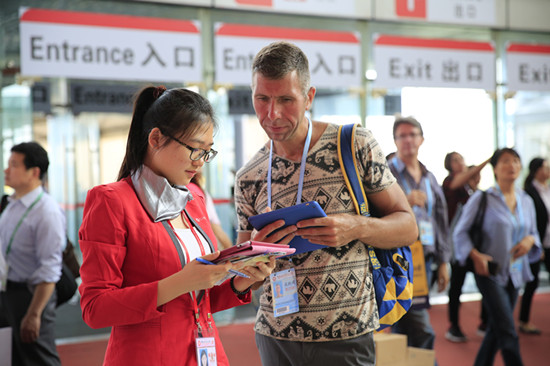
Student translators offer instructions to foreigners about how to use online trade platform
In a word, development in technology does bring learners convenience, but under any circumstances, it is practice that makes a successful translator.
The Interpreting Team’s Teamwork
Apart from being hard-working, it’s teamwork that pushes a team forward. The Interpreting Team of SITS schedules a regular practice session every week, the forms of which are model conferences or material-based interpreting. Two students from the team prepare for the materials, which will be shared by the whole team. Then the recordings from two random students will be played in front of the others. After that, teammates point out each other’s flaws. Director of the team pointed out that “the modes we use are alike, it’s how they evaluate the result of their training that matters.”
Every member contributes to the growth of each other by making comments or being made comments on. This is considered as a process where teammates contribute and are rewarded. So when the team is recruiting new members, teamwork is a very valuable factor to be taken into account. “Ultimately speaking, our interpreting team grows as a group.”
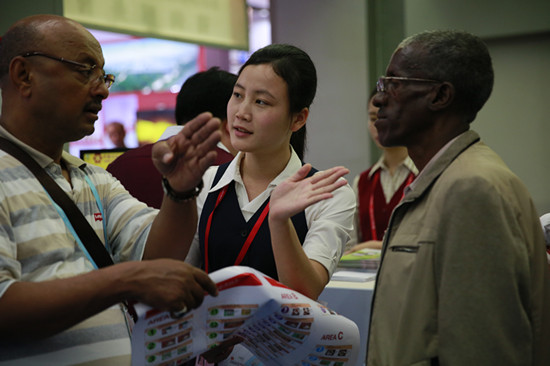
Translators sometimes are required to stand a whole day long
Regular weekly training is just a tip of an iceberg, considering how much more training students receive every day. They are sparing on effort just to become better translators and interpreters. As students, they don’t have the fame that professional translators have, nor are they paid decently. They don’t even see immediate progress daily. But it’s the faith that they will succeed one day, together with the company and encouragement they receive from their classmates and teachers, that urges them to keep going, in order to realize their dreams and become excellent translators.
Practice makes perfect. Opportunities are always for those who are well prepared. Translator CHEN Ming said: “Translating is passive. No matter how much you prepare, you never know what the speakers will say. A conference that lasts for an hour asks for a translator’s professional knowledge that is accumulated over a ten-year period.” Every translator is trying hard to improve themselves so as to excel in every task they undertake.
Explore the Secret Base of the Translation Training in GDUFS
Besides the translators, translating devices are also an essential part. In order to improve the verbal skills and the interpreting competence, advanced teaching facilities and bases have been established and brought in such as simultaneous interpretation systems, simultaneous interpretation laboratory and mock conference laboratory.
The devices of the simultaneous interpretation training classroom are mainly used for teaching. There are four mock booths (single) in the classroom, equipped with an infrared receiver and a single device for the interpreter. The infrared receiver is responsible for infrared data transmission for the use of presenter. The single device with a screen can be used to record, consult and arrange for the use of interpreter. The classroom can also record the sound, play the video and monitor the audio and video, which could be used as a mock simultaneous interpretation laboratory. at a more elevated training level, the devices in the mock conference laboratory provide access to simulating the real scene at the conference as well as testing the teaching achievement, which is no less great than an international conference.
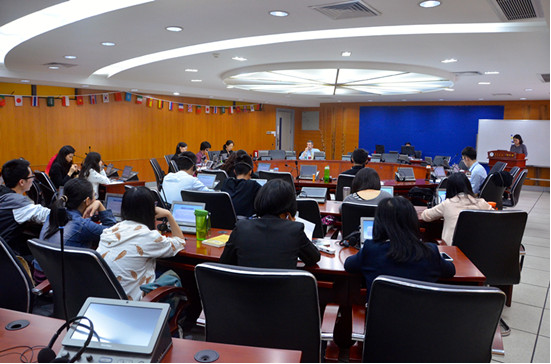
The mock simultaneous interpretation meeting room in the No.6 teaching building is a training ground that students both love and hate.
As a semi-hermetic dark room with limited space, the mock meeting room is dubbed by the students as the “threatening dark room”. But junior student HU Weitang with a major in German considers the “dark room” as a good place for in-depth thinking and anti-pressure training. German-language and interpretation teacher CHEN Jianing thinks that, with the professional lesson preparation and advanced devices, students’ capability of a quick reaction, flexible interpretation, bilingual transformation and the ability to work under pressure enhance significantly.
Simultaneous interpretation devices were deficient in the 1960s and 1970s compared with those available today. At that time, old-fashioned recorder was the only available resource for the foreign language students. Even so, the students who endeavored to learn and work in various languages didn’t strand themselves in the ivory tower. They seized the opportunity and devoted themselves to communication and practice just as CHEN Jianning said, “Practice surpasses everything.”
Rome was not built in one day. It is the meticulousness of the teachers and students as well as other nuanced details that drives GDUFS to gain great achievements in the interpretation area. Technology is the carrier for the language learner to get them to explore and develop their skills further.
“Full Fun” Interpretation Uneasy
Master-hands are everywhere in GDUFS and they are active in all kinds of international activities. Glamourous and popular in others’ eyes, they actually experience many obstacles and endeavor so tenaciously to step close to the full fun of interpretation. How to get to that point? Let’s just step into these hard-working interpreters’ lives.
Precautions Avert Perils.
“Before the moment of interpretation, you must be fully prepared”, Xiao Jing in SEIB said.
She was a volunteer for the Guangzhou International Award for Urban Innovation, which gave her many unforgettable experiences during the service process. She found her knowledge about English not enough after spending the whole day hanging around Guangzhou with a mayor from the Czech Republic as his guide. They visited the flower fair, fresh market and medicine market, during which time she came across some obstacles to interpreting some usual proper nouns.
In XIAO Jing’s view, enterprise material, relating the vocabulary and other necessary information used in the moment of actual interpretation, must be accumulated before the interpretation. At the same time, the interpreter needs to build up his confidence and spare no effort to do the job.
Communication, the Bounden Duty
Interpretation is not simply a language transforming act. As the medium of true communication, it’s the interpreter who steers the boat said Kelly of SEIB.
Kelly is a merchandiser in a foreign trade corporation now, having accumulated amounts of interpreting experiences, she recalled that, once, some emergency happened suddenly such as the two parties of the meeting began to quarrel because of lack of communication before the meeting. As an interpreter, what you need to do is control the situation and express their meanings clearly without any personal emotion. She thinks this really enhances interpreters’capacity to handle strain.
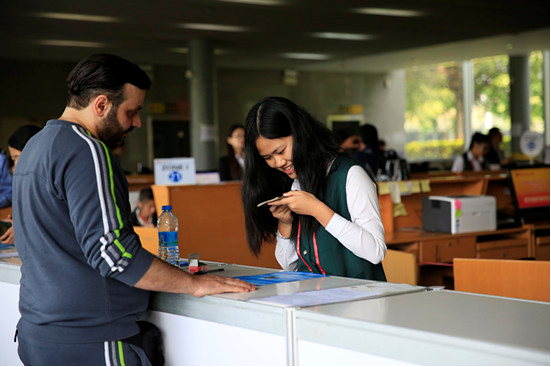
Volunteer of the Cards Issuing Counter providing service with smile during the Canton Fair.
Loneliness: the Journey of Interpreters
Interpretation is a job clothed with loneliness; on the stage and behind the scenes.
“Your job is about communication, but actually you do not communicate with people. You just say others’ words. No one cares about your ideas, neither can you yourself” Said ZHAN Cheng, the Vice Dean and Professor of the School of Interpretation and Translation. Therefore, to do this job well, you have to fight against loneliness. The act of interpretation is not just doing the exercise with your earphone, but the accumulation of wide ranging knowledge with curiosity and enthusiasm and a heart pursuing knowledge.
Both the practice of interpretation and that of translation need hardware like good bilingual foundations, quick reactions, concentration as well as wide range of knowledge without obvious weaknesses. Even faced with an unfamiliar area, interpreters must learn the related knowledge promptly. In addition, the software like anti-pressure capacity and anti-fatigue capacity are always essential. All these come from long-term studying and insight … plus self-reflection based on failures. The process is lonely. Only the one who can endure this can reap the fruits of success.
“GDUFS’ers” on the Canton Fair
Students at GDUFS take an active part in the Canton Fair multiple times every year. What has Canton Fair brought to them? Let’s listen to their stories-
Self-exercising
Almost all students who had been a volunteer at the Canton Fair thought they got good exercise from the working experience. Student Wang from the School of Chinese said she faced lots of trouble during the four-day interpreting service. She had to ask, several times, to confirm the meaning of a word or phrase because of the foreign merchants’ local accent. In a multi-party negotiation, she noted that she must behave properly and make sure no one would be neglected. She thought this experience was a good chance to get closer to her future career, and one which also improved her oral English and ability to face emergencies, all these benefiting her a lot. Student Zheng, from the Spanish-language major thought that the Canton Fair gathers people from different countries and that by communicating with them, he learnt about the differences between the cultures, the customs and the communications styles of each distinct culture.
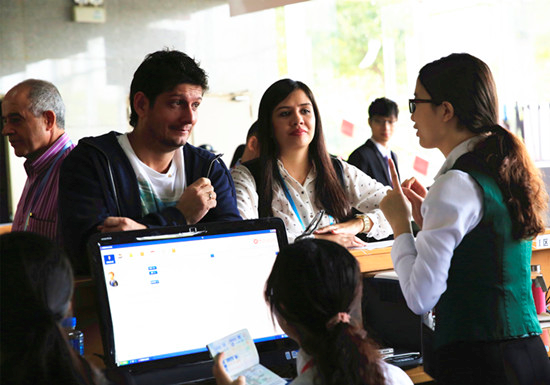
Volunteers at the Cards Issuing Counter answering foreign merchants’ questions in detail
Reaping Kindness
Indeed, working as an interpreter at the Canton Fair is not an easy task. Students face intense pressure from different kinds of problems caused by the language, customs and their own lack of experience. But they can always be touched by the kindness of their “clients” during the working process.
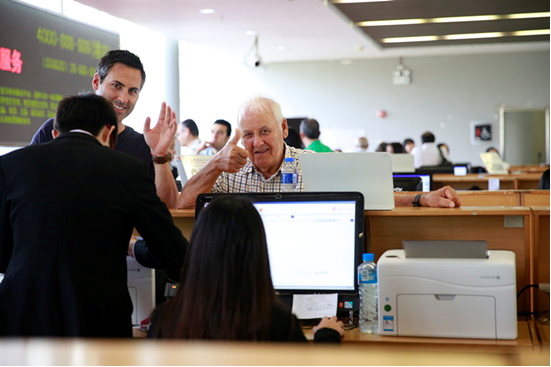
A foreign merchant giving a thumbs-up gesture to interpreters
“I often worked late during that time, arriving home pretty tired. But the guests always asked me to go home earlier. They even helped me hail a taxi and paid the fee, which touched me deeply”, said student Zheng. Student Wang also shared her experiences. She was nervous at the beginning for fear of making mistakes. Her boss kept encouraging her to seize the opportunity. And the foreign merchants always greeted her warmly. Sometimes delicate gifts would be given after the negotiation.
GDUFS’ers showed themselves as young professionals as well as improving themselves at the Canton Fair. Those memories, either tough or warm, will be long-lasting and become a precious fortune during their lifetime.

